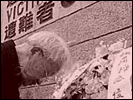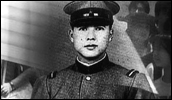Japanese Devils
- Year
- 2001
- Original title
- Riben Guizi
- Japanese title
- 日本鬼子
- Director
- Running time
- 160 minutes
- Published
- 6 May 2002



by G. Allen Johnson
It was never a secret that Japan's militaristic regime during the 1930s and early 40s was among the most brutal in human history - except to the Japanese people, who were largely oblivious, thanks to their government's propaganda. Whereas many of the atrocities perpetrated by the Nazis didn't come to light until after the German surrender in World War II, Japan's M.O. was well-known to the rest of the world ever since its invasion of Manchuria in the early 1930s.
It is something the nation - which has not had an official military since World War II - still struggles with today, and especially today. Recently, Japan's wartime activities have stirred fresh controversy because official history books taught in schools do not mention the atrocities. Also, visits by Japanese prime minister Junichiro Koizumi to Yasukuni Shrine, where the memorial tablets of many Japanese soldiers are mourned, went so far as to strain diplomatic relations between Japan and Korea, a victim of Japanese aggression.
Japanese Devils, then, is a movie the Japanese people desperately need. Director Minoru Matsui lets his video camera roll on the frank recollections of 14 men, all in their 80s, who were Japanese soldiers during that time, and who committed atrocities. They detail with shocking frankness what they witnessed - and what they did. The film opens in front of the Yasukuni Shrine, where two sets of protesters square off: a group of mostly young people, who shout, "Stop praising our deceased soldiers as war heroes!" and an older group of veterans and other citizens who honor "those who had to die". Then, separated by a thumbnail sketch of Japan's military excursions from 1931-45, come the interviews. One by one, the 14 men, looking kindly, sitting politely as if engaged in simple conversation at a coffee shop, detail their experiences.
First up is a former officer, Yoshio Tsuchiya, who in a letter of contrition and apology written to the Chinese government, admitted to killing 328 people and arresting, torturing, and imprisoning nearly 2,000 Chinese citizens. Tsuchiya explains Japan's policy of 'Strict Disposal', better known as unprovoked genocide: "We rounded up suspicious-looking Chinese and executed them in the back of the head. Doing this proved your loyalty to the emperor, and brought you great honor".
But that's only a warm-up. One army doctor experimented with biological weapons such as concentrated cholera, anthrax, and the plague on living Chinese subjects. Sometimes he performed vivisections; another doctor claimed soldiers would shoot Chinese prisoners and then force the doctors to try and save the victims as a form of training. The United States war crimes commission actually exonerated the doctors who spoke in Japanese Devils - in exchange for their research data.
Headquarters encouraged the atrocities with their various campaigns. Aside from Strict Disposal, there was the 'Three Alls Policy' ("Kill all, burn all, loot all") and, when the U.S. began winning the war in 1942, the 'Compulsory Seizure Campaign', in which the Japanese army kidnapped Chinese citizens and exported them to Japan to work in forced labor factories, aiding the Japanese war effort.
Matsui's strength is that he keeps it simple. One would be tempted to dramatize these stories with a load of old photographs and sappy music. But he believes, rightly, that these tales of inhumanity are more effective if the men simply sit and talk, in their own words, without cross-examination or judgment. One soldier, Taisuke Funyu, admits to setting fire to whole villages, and in one instances, burning down a house with an incapacitated mother who had just given birth. He heard her "death screams".
"Bayoneting a whore doesn't exactly feel good," Funyu explains. "But if you didn't do it... you'd never get promoted. I completely lost my humanity, I lost my human conscience. I was just like a fiend. The more I killed, the more I began to enjoy it." Another game was to force two villagers to have sex with each other, and just as the man was about to climax, a soldier would shoot him dead. "In Japan, arson and rape and murder are felonies," Funyu says. "But in the military, the more crimes you commit, the better your record."
Japanese Devils may be the first time that those who committed war crimes have so freely described what they did - I don't recall seeing any such documentary on Nazi war criminals, for example. These men are doing this because they now realize they were wrong, and they do not want anyone to forget it happened, so that hopefully it will not happen again.
Perhaps the most hopeful image of Japanese Devils is one of the ex-soldiers at a "War Exhibition for Peace" conducting a Q&A to a crowd, many of them teenagers and women, patiently answering their questions.